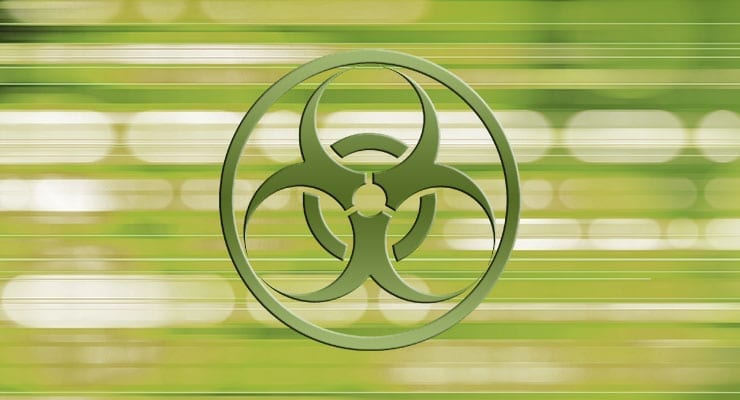This update is based on reporting by Richard Guthrie and the BioWeapons Prevention Project (BWPP), a civil society initiative that has provided independent analysis of all BWC meetings since 2006. BWPP’s “Setting the Scene” report for this session outlines the agenda, political dynamics, and recent developments shaping the discussions.
The Sixth Session of the Working Group on the strengthening of the 1972 Biological and Toxin Weapons Convention (BWC/BTWC) opens in Geneva on August 11, 2025, marking a pivotal moment in global biosecurity governance.
The session, running until August 22, follows the Ninth BWC Review Conference’s 2022 mandate to address key areas critical to reinforcing the Convention’s capacity to prevent the development, stockpiling, and use of biological weapons.
Public sessions will be streamed via UN WebTV and UN Listen Live, with official documents posted by the BWC Implementation Support Unit to the to the UNODA official web page of the Sixth Session.
Leadership and Continuity
The Working Group continues under the chairmanship of Ambassador Frederico S. Duque Estrada Meyer of Brazil, who assumed the role in 2024 following Ambassador Flávio Damico’s reassignment. He is joined by a restructured vice-chairmanship, with a replacement expected for Ambassador Camille Petit of France, who has rotated to a new diplomatic posting. Continuity in leadership is widely regarded as critical for navigating the complex, multi-year process of building consensus on sensitive issues in biological disarmament.
Since the Fifth Session, Ambassador Meyer has actively engaged with delegations and overseen several initiatives to advance negotiations, including regional seminars to facilitate dialogue. On 28 July 2025, he circulated to States Parties a “rolling text” — subsequently issued as CRP.1 of the Sixth Session under the title Working Group on the Strengthening of the Convention on the Prohibition of the Development, Production and Stockpiling of Bacteriological (Biological) and Toxin Weapons and on Their Destruction. This draft builds on an “elements paper” released in May, itself informed by discussions and feedback from the first five sessions.
Ambassador Meyer described the rolling text during a UNIDIR webinar as a tool to focus discussion on practical questions and move toward consensus. While deliberately omitting language on two proposed mechanisms (a scientific and technological review process and an international cooperation and assistance mechanism, which will be discussed in parallel), the text provides detailed recommendations in multiple areas:
- International Cooperation and Assistance (Article X): Proposals include creating an International Biosecurity Education Network, establishing a Laboratory Network with a “twinning” program for advanced labs, and launching a capacity-building fellowship program in relevant scientific and technological fields.
- Scientific and Technological Developments: Recommendations focus on promoting responsible innovation, horizon scanning for emerging risks such as AI and synthetic biology, developing national governance for biological risks, and creating formal expert panels to feed into BWC processes.
- Confidence-Building and Transparency: Measures include enhanced training and support for Confidence-Building Measures (CBMs), revising CBM formats every five years, and establishing an assistance network to help States Parties submit reports.
- Compliance and Verification: The text proposes establishing an Open-Ended Working Group to develop compliance and verification measures — potentially legally binding — covering on-site inspections, mandatory declarations, and investigative capabilities, drawing lessons from OPCW and IAEA verification regimes.
- National Implementation: Encouragement for States Parties to strengthen national laws, oversight of dual-use materials, and engagement with private-sector laboratories.
- Assistance, Response, and Preparedness (Article VII): Suggestions include creating an Article VII assistance database of deployable capacities, holding simulation and tabletop exercises, and formalizing voluntary guidelines for requesting assistance.
- Organizational, Institutional, and Financial Arrangements: Recommendations call for exploring the creation of a dedicated organization for the BWC, expanding the Implementation Support Unit, adopting multi-year budgets, establishing a contingency fund, and developing an integrated online portal for BWC resources.
The breadth of proposals in the rolling text reflects both the technical complexity and political sensitivity of strengthening the BWC. The discussions in Geneva over the coming days will test whether delegations can translate this ambitious framework into consensus-based outcomes.
Anniversaries, Milestones, and Missed Opportunities
The year 2025 holds particular significance: it marks both the centenary of the 1925 Geneva Protocol, which prohibited the use of chemical and biological weapons, and the 50th anniversary of the BWC entering into force. Many delegates had hoped to leverage these anniversaries to adopt substantive measures, possibly through a Special Conference. However, disagreement over the Working Group’s mandate — particularly Russia’s divergent interpretation — stalled momentum for such an event.
Why This Matters for Public Health and National Security
Although the BWC is a disarmament treaty, its scope and relevance extend far beyond arms control circles. The rapid evolution of biotechnology, synthetic biology, and pathogen research increases the dual-use challenge — where technologies intended for peaceful purposes can be repurposed for hostile use. Strengthening the BWC through improved verification, transparency, and preparedness mechanisms is essential not only for global security but also for safeguarding public health. Effective implementation reduces the risk of deliberate biological incidents, mitigates the spread of dangerous pathogens, and supports international coordination in response to outbreaks. For the United States and other nations, this work underpins both domestic biosecurity and broader national security interests.
Membership and Universalization
Two new States Parties — Comoros and Kiribati — have acceded to the BWC since December 2024, bringing total membership to 189 States Parties. All Asia-Pacific countries are now members, leaving only eight states worldwide yet to join. While universalization is addressed outside the Working Group’s mandate, the progress signals growing global consensus on the importance of the treaty.
Looking Ahead
The Ninth Review Conference urged completion of the Working Group’s tasks by the end of 2025, with some suggesting the 50th anniversary year could extend until March 2026. The coming days in Geneva will reveal whether consensus can be reached on key mechanisms, particularly in international cooperation, scientific review, and verification — areas long recognized as critical gaps in the BWC framework.


